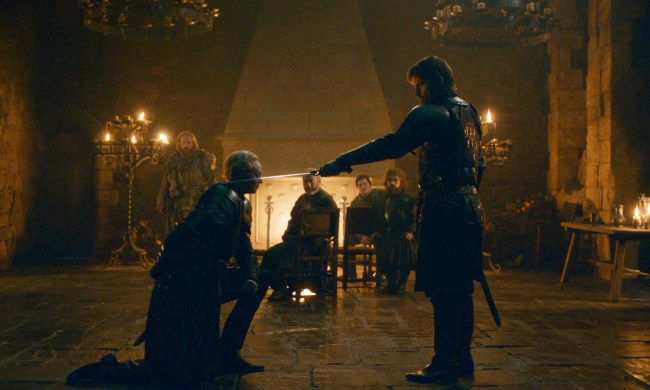It takes a lot of guts to try to follow up an iconic piece of superhero storytelling, and even more to do so in service of exploring some of the most troubling aspects of the genre’s past. Fortunately, if there’s one thing Damon Lindelof and HBO’s Watchmen have plenty of, it’s guts.
The superhero series, which premiered five years ago this month on HBO, is essentially a sequel to Alan Moore, Dave Gibbons, and John Higgins’ original, seminal Watchmen comic book that picks up 34 years after its ending. The show abandons the Cold War setting and tensions of its source material in favor of turning Watchmen‘s uniquely unsentimental eye on America’s ongoing, age-old issues with racism and white supremacy. In doing so, the series also gets to focus its scornful gaze on the history of the superhero genre itself.
When it aired in 2019, the HBO show rightly received widespread critical acclaim, but it feels like it has largely been forgotten in recent years. That’s a shame, considering it happens to be one of the boldest and most thought-provoking modern superhero projects that Hollywood has produced.
A Watchmen for a new era

Set largely in Tulsa, Oklahoma, HBO’s Watchmen finds America in another point of tense unrest. Recent attacks by a white supremacist group known as the Seventh Kavalry, which uses Rorschach-inspired masks as one of their calling cards, have forced members of Tulsa’s Police Department to don costumes and masks of their own to protect their identities. At the center of this conflict is Angela Abar (Regina King), a police detective who masquerades professionally as a tough, relentless vigilante named Sister Night. Watchmen follows Angela as her investigation into the Seventh Kavalry results in her uncovering lines of corruption running within her own police department, as well as details of her family’s untold vigilante past.
Along the way, multiple characters from Moore and company’s original Watchmen comic book are reintroduced, including Adrian Veidt (Jeremy Irons), Laurie Blake (Jean Smart), and Doctor Manhattan (Yahya Abdul-Mateen II). Despite this, Lindelof’s Watchmen never becomes overly precious with its source material. On the contrary, the series actually treats its characters and their vigilante lives with the same acidic tone and uncompromisingly tight grasp as original Watchmen writer Alan Moore. It even shares the same disgust for the troubling, sometimes fascistic power fantasy aspect of many superhero stories as its source material — and which Moore himself has only doubled down on over the years. It is a superhero series that reveals once again, in quite explicit terms, the easily corruptible nature of most powerful institutions, whether they be police departments, superhero teams, or billion-dollar corporations.
The show tackled a thorny subject with fresh perspective
Across its nine episodes, Watchmen also finds often fittingly upsetting ways of exploring the issues of systemic racism that have plagued America for centuries. It does this perhaps most bluntly in its opening sequence, which horrifyingly depicts the Black Wall Street massacre of 1921, and in its unforgettable sixth episode, which reimagines the origin story of the mysterious vigilante known as Hooded Justice in order to spotlight in tragic and stylish fashion the kind of generational trauma and centuries-spanning injustices that Black Americans have been forced to endure. Watchmen additionally builds off these themes and ideas through Angela’s surprising connections to Hooded Justice and Doctor Manhattan, both of which allow it to investigate the superhero genre’s problematic history of excluding people of color from its stories and its most formidable positions of power.

HBO’s Watchmen is the rare live-action superhero title that doesn’t feel constrained by fear or nostalgia. It’s a take-no-prisoners kind of legacy sequel — one that is neither afraid of angering longtime comic book fans. nor unwilling to rewrite and reinterpret its source material in ways that are sometimes jarring and unexpected, but always undeniably bold. Like the original Watchmen comic, it’s willing to take itself to task for engaging in the very same costumed power fantasies that it is designed to critique.
An open door, and a leap of faith

The HBO series goes further than that, too. It takes both America and the superhero genre to task — highlighting how the former has refused to do anything to truly address or eliminate its biggest issues and how the latter tends to lionize the very American institutions that have continually failed to protect all of their nation’s citizens. Rather than arriving at a similarly lose-lose, almost overwhelmingly nihilistic conclusion as its source material, though, HBO’s Watchmen leaves the door open for something — if not necessarily hopeful — then at least new. The show’s climactic installments ask whether or not America’s established power structures really can’t be left behind or replaced, and it eventually arrives at a final image charged with immense, provocative promise.
Is there still time for our notions of power and, specifically, who is allowed to wield it, to be changed and reevaluated? Watchmen doesn’t present a concrete answer to that question, but it goes out of its way to ask it. That alone earns the series a unique place in modern superhero media history. It isn’t often these days that comic book fans get a show so daring and filled with so much clear intention, but that only makes watching Watchmen an all-the-rarer and more special experience. It’s the rare legacy sequel that actually manages to not only live up to its iconic source material, but also replicate its singular spirit and appeal.
HBO’s Watchmen is streaming now on Max.




